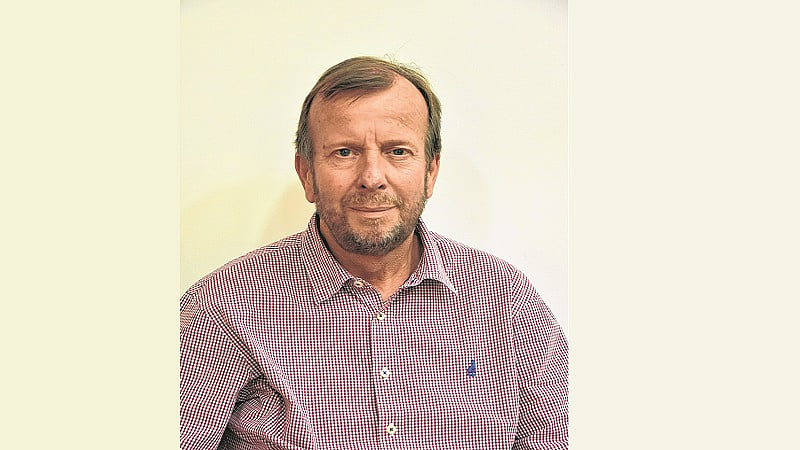Data centres figure among the new industries expected to catalyse the economic growth. The industry estimates India, which is expected to be a $4.5-billion data centre market this year, will touch $7 billion by 2020. In the global market, the share of India and APAC is increasing by 4.5 per cent and 12 per cent respectively. One of the players, AFL Hyperscale, looks to cash in on the opportunities available in India. The company, which offers optic fibre solutions to the industry, entered the Indian market in 2017 and is extremely bullish on its plans. Alan Richardson, who is in charge of the business development, discusses the market triggers, caution points and the company’s plans in a chat with Pankaj Joshi.
Edited Excerpts:
Can you give a background of your group and what does India represent for AFL Hyperscale?
The parent company of US-based AFL Hyperscale is Fujikura, which is listed in Japan and a global player in technology in fibre and electronics. It clocked a revenue of $8 billion in 2017.
AFL basically stands for American Fujikura and our revenues for FY2018 were $1.2 billion. We offer fibre optic solutions like manage the connections, optimise high-performance levels and enable the client to scale up the transaction level and thereby their business. Our areas of activity are in data centres and co-location businesses. In data centres, we would support the players which are looking at rapid scale-up of traffic (or hyperscalers as we call them). They would typically be in retail, financial services (BFSI space) or similar industries. The co-location industry is the other vertical which again has a strong scalability potential because of its strong business rationale.
From the perspective of both our activity areas, India presented an exciting market and so we have established a presence here out in Bangalore. We see the enterprise data centre market very strong and growing, but with cost issues. At some level, cloud and similar services have helped the market grow but the overall data centre is now getting more difficult and expensive in terms of set up and operations costs. Therefore, the activities are moving to co-location sites. This trend is playing out in India as well, where the co-location industry is also having good roots. So we are seeing a strong market expansion in India. We also have an ambitious plan for the country.
Independent surveys showed India as the second biggest (fastest) growth market worldwide for data centres. In this total industry size, our activity (fibre optic solutions) specifically would account for 4-5 per cent of the total size. For the current year itself, AFL in India is seeing a 70-80 per cent growth over the first year revenues. India is a definite action area.
What are the specific factors which make India exciting?
In the digital sector in totality, Indian companies and people have proven innovation capabilities. We believe that Indians as a whole are capable of creating disruptive growth opportunities, as well as harnessing them. The recent growth in cashless economy is just one example of this. We would want to be a positive force in this kind of disruption. India’s initiative to drive fibre to the village level is extremely commendable and, if it succeeds, will be a landmark achievement. Apart from the obvious client industries mentioned earlier, we are quite enthusiastic about government organisations as a client sector. We believe the government needs to take data centres more seriously in its own plans in four key areas – digitisation, education, handling volume and security of all kinds of transactions and enabling growth of high-value skill sectors in the economy.
Another trigger for it is regulation. We believe that confidentiality norms are on the way which will fuel data centre growth in the local market. A couple of months ago there was a regulation tabled stating that the data of a country must be locally stored.
What are the challenges in the Indian market?
If you look at challenges, the paramount one is power. There are three critical aspects of power for a data centre – the availability, the quality of available power and of course the cost of power. India has issues on all three fronts.
The second challenge is that many large potential clients would want to have their own fibre-based connectivity. That in turn means multiple digging operations in the same path, which presents the danger of cable damage. Similarly, there are laws and stipulations which create restrictions on building networks and data centres.


Another reality for the Indian market is that location, which connectivity is supposed to take out of the equation, is still very important. For instance, Mumbai though expensive, remains a popular location because it has lots of landing stations for the trans-Atlantic or submarine cables which carry data across continents. These cables are a critical part of the global data transmission network and by extension so are the landing stations. The more you move to the hinterland away from the landing stations, the lesser is the strength of connectivity.
Mumbai followed by Chennai especially the port locations are hot by default. Mumbai ranks well both on connectivity and power. Then you look at high usage hubs which again would have landing stations like Bangalore or Hyderabad. The market can develop on the back of greater penetration of landing stations. On the ground, fibre does not fail once it is in place. The reasons for network downtime are generally related to switches, routers, the active devices and the human element.
How do you intend to roll out your business?
Locally, we have partnered with Citadel Intelligent Systems which have enabled us to hit the ground running. The group is active in multiple areas including defence and aerospace, however our collaboration with them is limited to fibre optic connectivity solutions. If you talk of the scale-up blocks, the first priority would be to support our global clients who are active here. Second would be to create a client base of local companies in parallel.
At the back-end, we intend to invest and develop manufacturing capabilities, both through in-house facilities as well as by local sourcing. The difference in operational methods for AFL is that we are more in dealing directly with clients in the marketplace, compared to other peers who operate through the dealer/ distributor channel. We aim to bring to the table a good level of market understanding as well as understanding of the client requirements, and it is in that context we have clearly defined where we want to seek our clients.









